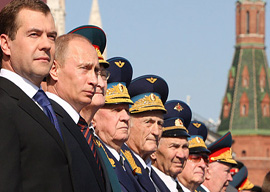
December 06, 2011

Dmitry Medvedev and Vladimir Putin
At the same time, Russia’s vaunted strengthening in foreign affairs, something that is important to many Russians distressed by the apparent destruction of their supposedly once-great country, has become less obvious. When Russia took on tiny Estonia over the question of the Red Army memorial statue, Estonia won despite the bullying and the cyber attacks. Estonia’s population is a little over one million.
The war in the Caucasus continues, with periodic irruption of terrorists into the rest of Russia, leading to catastrophic results and no inquiries when things go wrong—as they always do. The world refuses to see Russia as the victim. UN statements about the Middle East and North Africa and threats to the West are routinely ignored. Russia’s military is seen as a shameful joke despite the amount of money that was supposedly pumped into it. But as always, the money seems to have disappeared. The country’s general corruption and lawlessness—with politicians, businessmen, journalists, and human-rights activists murdered, beaten up, and threatened—are widely accepted by Russians who mostly shrug their shoulders while sighing stoically. But they can no longer pretend that this is normal, or that these are the birth pangs of a new and better society, or that Russia is really superior to the West. Too many people travel abroad and stay abroad. Too many people have access to the Internet and can thus bypass the government-controlled media.
The media (and, in turn, the people) can dismiss Western criticism of such episodes as lawyer Sergei Magnitsky’s suspected murder while in police custody as “Russophobia.” What cannot be dismissed is the farcical and humiliating situation in which two people toss the presidency and premiership back and forth between them.
Whatever reason caused people to vote overwhelmingly for Vladimir Putin and his party in the past—genuine popularity, fear, or the lack of alternatives—all that is now changing. The people are becoming fractious.